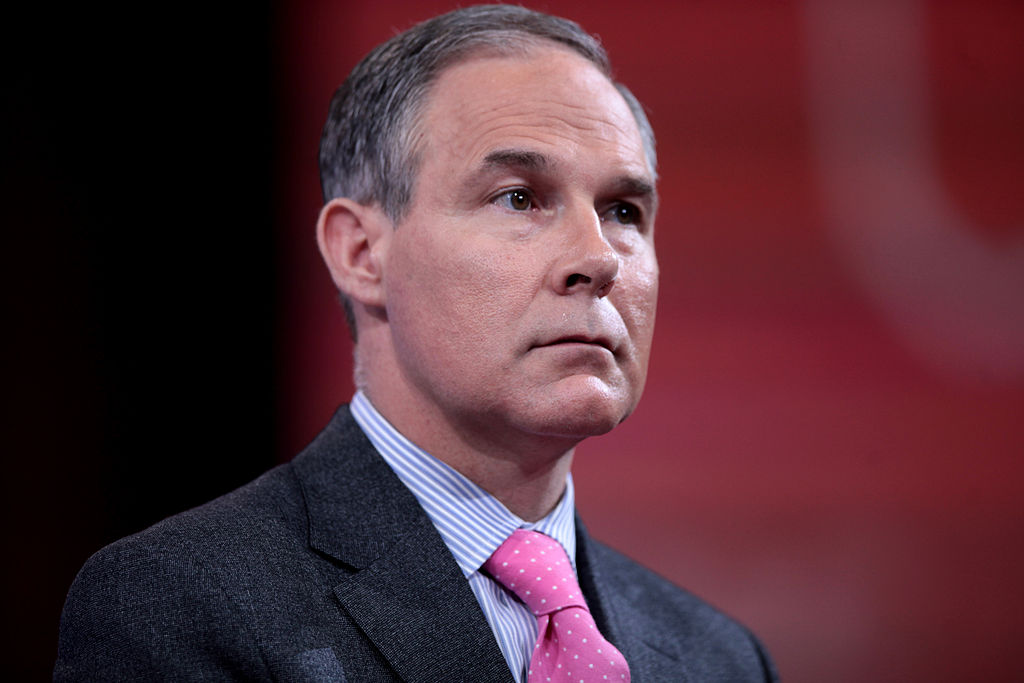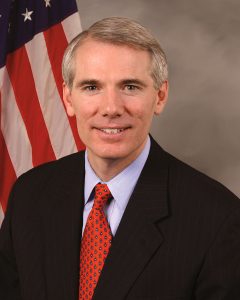
On Tuesday, February 21st, the new head of the Environmental Protection Agency addressed his staff for the first time. Scott Pruitt said, “We as an agency and we as a nation can be both pro-energy and jobs, and we can be pro-environment, and we don’t have to choose between the two.”
He spoke at the EPA’s Washington headquarters, and his remarks were also streamed to the EPA’s 15,000 employees across the nation. He urged his employees to focus on more core functions, and told them that by doing so, they can do a better job of curbing air pollution and cleaning toxic chemicals from old industrial sites.
By all accounts, he was facing a skeptical staff.
Nearly 800 former EPA officials signed a letter urging the Senate to reject Pruitt’s confirmation.
President Donald Trump’s administration has drafted documents directing Pruitt to dismantle many measures and cut the number of EPA employees. The union representing agency employees has launched an online campaign against Pruitt’s agenda.
Scott Pruitt’s Background
Edward Scott Pruitt, 49, is a lawyer and a Republican politician who was Oklahoma’s Attorney General for the past 7 years. In that job, he is perhaps best known for his fight against environmental regulations. Though his critics call him a “climate change denier”, he has often described himself as a “leading advocate against the EPA’s activist agenda.”
In early 2016, Pruitt wrote in the National Review: “Scientists continue to disagree about the degree and extent of global warming and its connection to the actions of mankind. That debate should be encouraged—in classrooms, public forums, and the halls of Congress.”
One of the first things he did as Oklahoma’s new AG was to dissolve the state’s Environmental Protection Unit. He created what he called a “Federalism Unit” dedicated to fighting President Barack Obama’s regulatory agenda. He sued the EPA to block its Clean Power Plan and Waters of the United States rule. He also sued the EPA on behalf of Oklahoma Utilities who said they were saddled with EPA regulations. He lost all the lawsuits.
In all, he sued the EPA a total of 14 times.
Confirmed by the Senate on Friday, February 17, by a vote of 52 to 46, he is now the 14th Administrator of the Environmental Protection Agency.
His confirmation came a day after a District Judge in Oklahoma County ruled that the Oklahoma Attorney General’s office must turn over more than 2,500 emails and correspondence between Scott Pruitt and oil and gas firms. The ruling was in response to a lawsuit from a watch-dog group and the ACLU alleging that Pruitt’s office had violated Oklahoma’s open records law.
He tells the Wall Street Journal, “There is no reason why EPA’s role should ebb or flow based on a particular administration, or a particular administrator.” He says. “Agencies exist to administer the law. Congress passes statutes, and those statutes are very clear on the job EPA has to do. We’re going to do that job.”
Concerns About Pruitt
Great Lakes Now got reaction to Pruitt’s confirmation from organizations and individuals across the Midwest who work to help keep the Great Lakes healthy.
This is from the Alliance for the Great Lakes based in Chicago:
“We’re disappointed with the confirmation of Scott Pruitt as U.S. Environmental Protection Agency Administrator. The people of the Great Lakes, time and again, have voiced overwhelming support for investing in clean water and protecting it through regulation, and we need both to keep the Great Lakes clean and safe. While Pruitt has indicated that he will support the U.S. EPA-led, extraordinarily successful Great Lakes Restoration Initiative—though he has not specified support for full funding— his track record indicates that he will constrain U.S. EPA’s ability to implement bedrock environmental protections. When thousands of Great Lakers do not have access to safe drinking water and the lakes are being poisoned by toxic algae, we need a stronger and more accountable U.S. EPA.”

Bradley Cardinale, professor at the School of Natural Resources and Environment, courtesy of Austin Thomason, U-M Photo Services
Professor at the University of Michigan’s School of Natural Resources and Environment, Dr. Bradley Cardinale, tells Great Lakes Now:
“The appointment of Scott Pruitt as head of the U.S. EPA leaves me deeply concerned about the future of the Great Lakes. Pruitt’s record of environmental stewardship is, frankly, nothing less than dismal, and giving him authority over the agency charged with maintaining the quality and sustainability of freshwater supplies in the U.S. should concern everyone who call the Great Lakes their home. Residents, governors, and legislatures need to stand-up and insist that Pruitt does his job to protect the Great Lakes.”

Joe Árvai Faculty Director, Erb Institute for Global Sustainable Enterprise, courtesy of erb.umich.ed
Dr. Joe Arvai, Director of University of Michigan’s Erb Institute for Global Sustainable Enterprise, says he is concerned about Pruitt’s appointment. He tells Great Lakes Now:
“I’d like to know, for example, what his thoughts are on the scientific aspect of the EPA’s mission? The EPA doesn’t create and enforce rules in a vacuum; they are science-based and are frequently scrutinized by the agency’s Science Advisory Board which consists of industry and academic scientists that have all been thoroughly vetted for conflicts of interest. The president, who put forth Mr. Pruitt’s nomination, doesn’t seem to have much of an appetite for science; it would be important to know where Mr. Pruitt stands.”
Dr. Arvai continues,
“Beyond science, I’d also like to know where Mr. Pruitt stands on the EPA’s regulatory mission. Many of the rules targeted in the past by Mr. Pruitt and the president are on the books and will not be easy to dismantle. However, they can be marginalized by the agency; for example, the EPA could simply choose to not enforce certain rules. Should this happen, we might expect to see declines in environmental quality in key areas that are of great importance to Americans. As a Michigander, specifically, water quality issues immediately come to mind surrounding the Great Lakes. The EPA regulates a broad range of pollutants, and also things like ballast water ships that operate on the Great Lakes. To turn a blind eye to these kinds of issues would heighten risks to both environmental and — importantly — human health in the state. I’d venture that if you voted for the president in Michigan because you felt left behind by government, you’ll feel let down by a decision that puts your health, and the health of the environment around you, at risk.”

Director of The Center for Local, State and Urban policy at the Gerald R. Ford School of Public Policy, courtesy of fordschool.umich.edu
Director of The Center for Local, State and Urban policy at the Gerald R. Ford School of Public Policy in Ann Arbor, Dr. Barry Rabe says:
“Administrator Pruitt routinely emphasized the idea of “cooperative federalism” during his confirmation hearings, suggesting a more state-centered approach. But it remains unclear just what this might mean for Michigan and the Great Lakes, both in terms of funding and regulatory authority in areas such as air and water quality. Most Great Lakes states have struggled to sustain staff and budgets in these areas in recent years and so one challenge under decentralization will be resources to sustain core programs.” Rabe says, “The likely EPA strategy on climate change under Administrator Pruitt will be to pull back recent federal initiatives for power plants and, possibly, motor vehicles. This suggests that states like Michigan will be given far more latitude to design their own approaches to greenhouse gas emissions reduction–or simply ignore the issue. This will be a major test of the idea that delegating functions in environmental policy to states can produce better outcomes.“
As Michigan’s Democratic U.S. Senator Debbie Stabenow voted against Scott Pruitt’s confirmation, she said:
“People come to the Great Lakes from all over the country. They are a part of our DNA and our way of life in Michigan. They contain 20% of the world’s fresh water and support more than 1.5 million jobs. We need leadership at the EPA that we can count on to protect the Great Lakes, and the nearly $62 billion in wages that are tied directly to jobs and industries that depend on these precious waters to operate. Mr. Pruitt’s record of siding with polluters over sound science puts him outside the mainstream of what we should expect from our EPA Administrator. It is for these reasons that I intend to vote against his nomination and would urge my colleagues to do the same.”
Pruitt: “You Can’t Lead Unless You Listen”

United States Senator Rob Portman of Ohio, courtesy of United States Senate
A U.S. Senator from another state that borders the Great Lakes, Republican Rob Portman of Ohio, voted in favor of Pruitt’s confirmation. He stated,
“Like all Ohioans, I want to protect our water and air and that’s why I’ve worked so hard through my legislation to protect Lake Erie, preserve our national parks, and reduce carbon emissions through greater energy efficiency. When I met with now Administrator Pruitt, he committed to continue the work we’ve started to protect Lake Erie from harmful algal blooms and invasive species and to fully implement and fully fund my legislation to reauthorize the Great Lakes Restoration Initiative. He also committed to finding the appropriate balance to both protect the environment and protect Ohio jobs and our economy. That balance was often absent in the previous administration when the EPA proposed sweeping regulations that did not adequately consider their impact on jobs in Ohio.”
Portman continues:
“Attorney General Pruitt joined Ohio and other states in the effort to block the EPA’s Clean Power Plan, a regulatory overreach I opposed because it would have resulted in higher electricity prices and lost jobs in Ohio. As a result of their efforts, the Supreme Court halted the rule while the full merits of the case are decided. I look forward to working with Administrator Pruitt to continue the work of protecting Ohio’s natural resources while also considering the economic impact of our regulations.”
Conservatives and the energy industry are praising Pruitt for being an advocate for giving states more control over environmental rules and for fighting what they see as regulatory overreach by the Obama administration.
No EPA official or employee would agree to comment on Pruitt’s confirmation for Great Lakes Now.
In speaking to his EPA staffers for the first time, Pruitt promised to keep an open mind. He said, “You can’t lead unless you listen.”




